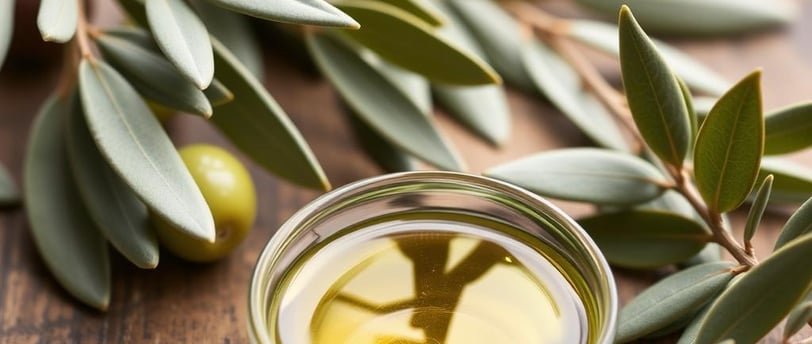Olive Leaf for Heart Health: The Mediterranean Secret to a Healthy Cardiovascular System
❤️HEART HEALTH


Introduction
The Mediterranean diet has long been synonymous with heart health, thanks to its emphasis on whole foods, healthy fats, and antioxidant-rich ingredients. One integral component of this diet that's often overlooked is the olive leaf (Olea europaea). Known primarily for its use in oil and culinary applications, olive leaf has garnered attention for its impressive health benefits, particularly concerning cardiovascular health. In this article, we will delve into the various forms available for olive leaf, recipes featuring this superleaf, its potential dosage, side effects, essential precautions, and its scientific basis.
Forms Available
Olive leaf can be found in several forms, making it easy to integrate into your daily health regimen. Here are the most common forms available:
Olive Leaf Extract (OLE): This is perhaps the most concentrated form, available in liquid or capsule form. Extracts contain a higher concentration of oleuropein, the compound responsible for many of its health benefits.
Dried Olive Leaves: These can be brewed into a tea, allowing you to consume the beneficial compounds naturally.
Powdered Olive Leaves: This form can be added to smoothies, food, or utilized in various recipes.
Tinctures: Olive leaf tinctures are alcohol-based solutions that capture the essence of the leaf, making it easy to consume in fluid form.
Olive Leaf Tea Bags: Pre-packaged tea bags containing dried olive leaves allow for convenient brewing at home or on the go.
With various forms available, individuals can choose the one that best suits their lifestyle and preferences.
Culinary Uses and Recipes
In addition to its health benefits, olive leaves can be incorporated into your diet in delicious and inventive ways. Here are a few recipes that utilize olive leaf:
Olive Leaf Tea
Ingredients:
1-2 teaspoons dried olive leaves
1 cup boiling water
Honey or lemon (optional)
Instructions:
Place dried olive leaves in a teapot or infuser.
Pour boiling water over the leaves and steep for 5-10 minutes.
Strain, add honey or lemon if desired, and enjoy your cup of heart-healthy tea.
Olive Leaf Smoothie
Ingredients:
1 banana
1 cup spinach
1 tablespoon powdered olive leaf
1 cup almond milk
1 tablespoon honey (optional)
Instructions:
Combine all ingredients in a blender.
Blend until smooth.
Serve immediately for a refreshing, antioxidant-packed smoothie!
Olive Leaf-Infused Olive Oil
Ingredients:
1 cup olive oil
2-3 fresh olive leaves
Instructions:
Gently heat the olive oil over low heat for about 30 minutes.
Add fresh olive leaves and allow them to steep.
Let cool, strain, and use the infused oil for salad dressings or drizzles.
These recipes not only provide a simple way to utilize olive leaf but also contribute to a heart-healthy diet.
Dosage
When considering olive leaf for health benefits, proper dosage is crucial. While there is no universally accepted dosage, research and anecdotal evidence suggest the following general guidelines:
Olive Leaf Extract: The common dosage ranges from 500 mg to 1,000 mg per day. It may be taken in divided doses.
Dried Olive Leaves: When consumed as tea, the recommendation is to use about 1-2 teaspoons of dried leaves per cup of water, steeped several times a day.
Powdered Olive Leaves: For added health benefits in smoothies, a tablespoon per serving is typically sufficient.
However, it is wise to consult with a healthcare professional before starting any new supplement, particularly if you’re on medication or have existing health conditions.
Side Effects
While olive leaf is generally considered safe for most individuals, it comes with potential side effects. Some may experience:
Gastrointestinal Distress: This can include symptoms such as nausea, diarrhea, or stomach cramps.
Headaches: Some may experience minor headaches, particularly when taking high doses.
Interaction with Medications: Olive leaf can potentially enhance the effects of hypoglycemic medications or blood thinners, leading to unexpected complications.
Allergic Reactions: Although rare, some individuals may experience allergic reactions, such as skin rashes or difficulty breathing.
If you notice side effects after consuming olive leaf, it is advisable to reduce the dosage or discontinue use and consult a healthcare provider.
Precautions
Before adding olive leaf to your health regimen, consider these essential precautions:
Consult Your Doctor: Particularly for individuals with existing health conditions, pregnant women, or those on medication, consulting with a healthcare professional is crucial.
Start Slow: If you are new to olive leaf, begin with a lower dosage to assess tolerance before gradually increasing.
Monitor Blood Sugar Levels: If you have diabetes or are on medication affecting blood sugar, closely monitor your levels to avoid unexpected drops.
Allergies: Ensure that you are not allergic to olive leaves or related plants in the Oleaceae family.
Scientific Basis
The benefits of olive leaf for heart health are backed by a growing body of scientific research. Studies show that oleuropein, the main active compound in olive leaves, exhibits significant antioxidant, anti-inflammatory, and antihypertensive properties.
Antioxidant Properties: Research indicates that the antioxidants in olive leaf help combat oxidative stress, which is linked to heart disease and other chronic conditions.
Anti-Inflammatory Effects: Chronic inflammation contributes to various cardiovascular diseases. Olive leaf extract has been shown to reduce markers of inflammation within the body.
Blood Pressure Regulation: Some studies suggest that olive leaf may help lower blood pressure, making it an effective adjunct to heart health management.
Cholesterol Management: Furthermore, olive leaf may assist in lowering bad cholesterol (LDL) levels while increasing good cholesterol (HDL) levels.
Conclusion
Incorporating olive leaf into your diet may provide an array of benefits, particularly for heart health. With various forms available, delicious recipes to try, and a solid scientific basis for its effectiveness, olive leaf stands out as a powerful herb worthy of consideration.
As with any supplement or dietary change, it's paramount to approach with caution, particularly concerning dosage, potential side effects, and necessary precautions. By doing so, you could embrace not only a Mediterranean secret but also a natural ally in your pursuit of a healthier heart.
